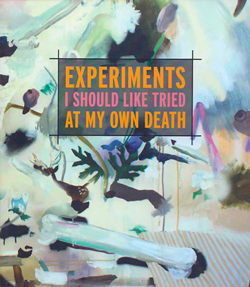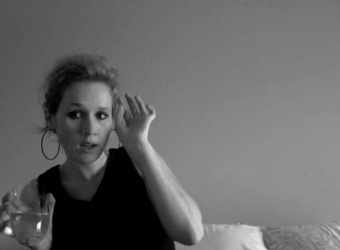
First Book Questionnaire: Caryl Pagel | November 9, 2012.
1. Does your manuscript bear any relation to a graduate thesis project?
My graduate thesis—titled The Sick Bed (an homage to the town it was composed in and also a nod to mine own mind’s mad state during that manic and fretful writing time), clad in evergreen plastic canvas with pressed gold lettering, retired, catalogued, entombed midway through the third floor of Main Library and framed now somewhere between such wonderful projects as Janine Oshiro’s Pier and Sam Reed’s Virga—was predominantly comprised of a now-abandoned collection of poems I wrote during the years just before and during my residence at 811 ½ Fairchild Street, Iowa City, IA, 52245, which was a tree house with spring blue walls and a door-desk lovingly left behind by the previous (capable, gun loving, counterfeiting fiction writer) tenant, as well as a couch fashioned from forest. This collection invented a fictional farm; it reveled in plot and plots and form and fire and horizon lines. It was tethered to William Faulkner’s “Barn Burning,” and Lars von Trier’s Dogville, and Dickinson’s letters. But no, not really—a few poems at the conclusion of this pile hint wildly at what was to come next, but not very many ended up in Experiments I Should Like Tried At My Own Death.
2. How do you feel about these poems now that they’ve materialized in book format?
I feel frightened, animated, affectionate, jokey, riotous, and sorrowful. I feel grateful for Katie Batten’s beautiful painting (plants with bones) on the cover, and ecstatic about the back-cover skull. A friend once said, while or during or just after slicing me a corner of his recently scored free pizza, that after the book is published the poems are no longer yours—they belong to readers. If this is true: what a relief! A blessing! An honor! A horror!
3. What was your experience when you began publishing? What challenges did you encounter?
One of my first publications was in Octopus Magazine, in 2005, as a part of their “New Poets” issue. Zach Schomburg accepted a somewhat sizable selection (eight poems, as Octopus is wont to do), and this commitment to a lengthier feature felt unique and thrilling. If you return to Octopus #6 you will discover several other amazing poets (Danny Khalastchi, Heather Christle) caught in that black, orange, and neon green issue-space; I was archived in good company. Also with those early eight appeared a generous and thoughtful introduction for which I remain forever indebted to Dan Beachy-Quick. After that came challenges, sure. Not any of which remain memorable or important. Most publishing challenges are challenges because of exactly that: publishers or organizations prove themselves boring or bureaucratic or monotonous whereas writing itself (and publishing in the best cases) is electrifying and collaborative and transformative with an eye to form and content, circumstance and mystery.
4. How, if at all, did chapbooks prepare you for the making of a full-length collection?
Factory Hollow published a chapbook of mine—Visions, Crisis Apparitions, & Other Exceptional Experiences—in 2008 after I had written about half of what was to become Experiments. The chapbook not only revived my practice (that year was mostly winter), but also required me to once again consider what I was asking of poetry and a life mixed up with art. Factory Hollow was so amazing (thoughtful editing, lots of freedom, enormous energy and attention) that at times I worried they had spoiled me from wanting to work with any more institutional or predictable press. I was concerned that I would never—could never!!—truly love another. Turns out I didn’t have to; the flirtation evolved into commitment.
5. How did you shape and order your manuscript?
There existed several early versions but ultimately this was a task that—after years of staring at and living within the manuscript—I could no longer approach with a sufficient amount of bewilderment. I desired an order that would surprise even myself; that would make this book alien and strange; that would create distance and allow me to encounter the work as if not my own. Thus followed several conversations with the ever-brilliant Emily Pettit who described to me how she patiently arranged each poem of mine in a long line across the floor of her hallway, and who read the manuscript again and again on a train, and in Texas, or maybe Kansas, and whose insight and ideas re-illuminated the poems in my mind and helped me make final decisions. Early versions were also strengthened by Andy Stallings, who is incredibly smart about pacing and line edits. I take great pleasure in considering the overall vision of a collection; when it is not my own work it is my favorite step in the process.
6. Was anyone or anything indispensable in the process of making your debut collection?
The Proceedings of The Society for Psychical Research; Factory Hollow; all of my friends who care about writing; all of my friends who don’t care about writing; public libraries; my brothers; my mother; Lake Michigan; Emily Dickinson’s Herbarium; summer nights at George’s; Amy Margolis; Marvin & Dorothy Bell; In The Airplane Over The Sea; The Essential Nina Simone; my astonishing students at MIAD and Carthage; soft gs; Cracker, Lime, or Nothing; Monsters of Poetry; the 2011 Green Bay Packers Super Bowl win.
7. What is your impression of book contests?
For a while I didn’t understand that there were other options. Even now when poets say: Hey! There are other options! I am unsure because there is little way of actively participating in your own solicitation and few presses host open reading periods. That’s okay. When you contribute to a press you admire (for me: Ahsahta, Fence, Omnidawn, 1913, etc.), even if they don’t choose your manuscript the editors will most likely publish writing for which you are grateful, making the check a gesture of confidence in editors you admire. There is certainly something depressing about sponsoring a press that lacks originality, professionalism, or courage; let’s stop doing that.
These days I think about this issue more often in connection with the small press that I edit. When I encounter radiant work in the world, or become aware through acquaintances, friends, readings, journals, or other editors of something Rescue Press must publish, I solicit. I like that option. I like having control over who becomes a member of the chaotic family band that is Rescue. And yet, we run an annual contest because there is no way of discovering certain work without asking for it. As for the cost, it can be an obstacle to getting one’s work out and also an obstacle to publishing. One year we charged a tiny fee. We also hosted a free open reading period. This year we experimented with the Radiohead/Fence model: offer what you will. None of these systems is ideal but they all have positive outcomes (books!) and I guess at some point one commits to engaging; doing, still doing, questioning, changing, making, trying.
8. How did you learn to navigate the press world?
Reading and research and patience and listening. Writers like to share; they like to talk about exciting projects and harebrained schemes and insane plans to invent things and destroy things and collaborate and gossip and confess and create. To learn about presses I read and read; talked to writers when not hiding in closets or corners; talked to writers when encountering them also hiding in closets or corners; attended readings; obsessed over money and jobs; ignored money and jobs; continued writing; watched; waited; endured; traveled; went to the bar; lost my mind; saw some art; took long walks; started over; threw it all out; failed; taught; carried on dramatic correspondences, etc. I learned to navigate the press world as a side effect of living and paying attention and working as an artist. John Cage says, “the only rule is work…”
9. What aspirations did you have for this book?
Making something out of nothing? Unapparitionalizing? Unbecoming nothing as a mode of rediscovering the nothing that one always is? Book as excuse for party? Book as impetus to write? Book as thorn? Book as shield? Book as evidence? Book as pyre? Book as memorial? Book as blunt force object? Book as gift? Book as missive to you, you!, long-lost and only you? Book as open secret? Book as parachute?
10. How would you describe this work?
Visions, emergencies.
11. Do you work primarily on discrete poems, serially, toward a project, with a set of concerns, or otherwise?
A project is a challenge that helps me begin, but rarely manifests itself as stable, strict, or realized. For example, I’ll say to myself: I’m going to write a book of sonnets now! Here I go!, or Why aren’t there more poems about Wilky James, William’s lesser known younger brother? and then write five of a kind and move on—but the initial mission engages my mind. I’m a slave to form, or the promises of form (see the various sonnets, syllabics, lists, indexes, mythologies, collages, and elegies in Experiments), even if (hopefully if!) the structure transforms and breaks during making. A girl’s gotta (pretend to?!?) set some goals and limits! and I experience the word “project” less as outcome than measured generating force. I develop a plan, conduct experiments, fail, try again. If I have one consistent mode of working, regardless of genre, it is to inhabit research, art, and reading.
12. Whose poems affect you or your work?
Writers who influenced Experiments I Should Like Tried At My Own Death were: Inger Christensen, Sherwood Anderson, Shirley Jackson, W.G. Sebald, Marianne Moore, Pam Rehm, Yehuda Amichai, Dan Beachy-Quick, Claudia Rankine, Hereward Carrington, Lorine Niedecker, Peter Greenaway, Elizabeth Bishop, Jacques Derrida, Robyn Schiff, Jorge Luis Borges, Barbara Guest, Craig Dworkin, Emily Wilson, James Merrill, H.D., Paul Celan, The Baroness Elsa von Freytag-Loringhoven, and John Taggart.
13. What are you reading now?
I’m always reading Madeline McDonnell’s There Is Something Inside, It Wants To Get Out and Vinnie Wilhelm’s In The Absence of Predators. I recently enjoyed Thomas Bernhard’s Correction, Amber Dermont’s The Starboard Sea, Nick Dybek’s When Captain Flint Was Still a Good Man, Ford Madox Ford’s The Good Soldier, Margarita Karapanou’s Kassandra and The Wolf, and Adam Levin’s The Instructions.
14. What are you working on now?
Last summer I wrote a new manuscript of poems, Twice Told, following a road trip to and through and around the Badlands and neighboring Nebraska ghost towns. Mostly, though, over the past few years I’ve been working on nonfiction—essays that take forever to finish because composing in prose makes everything new again and scary, mesmerizing, entirely and terribly impossible.
